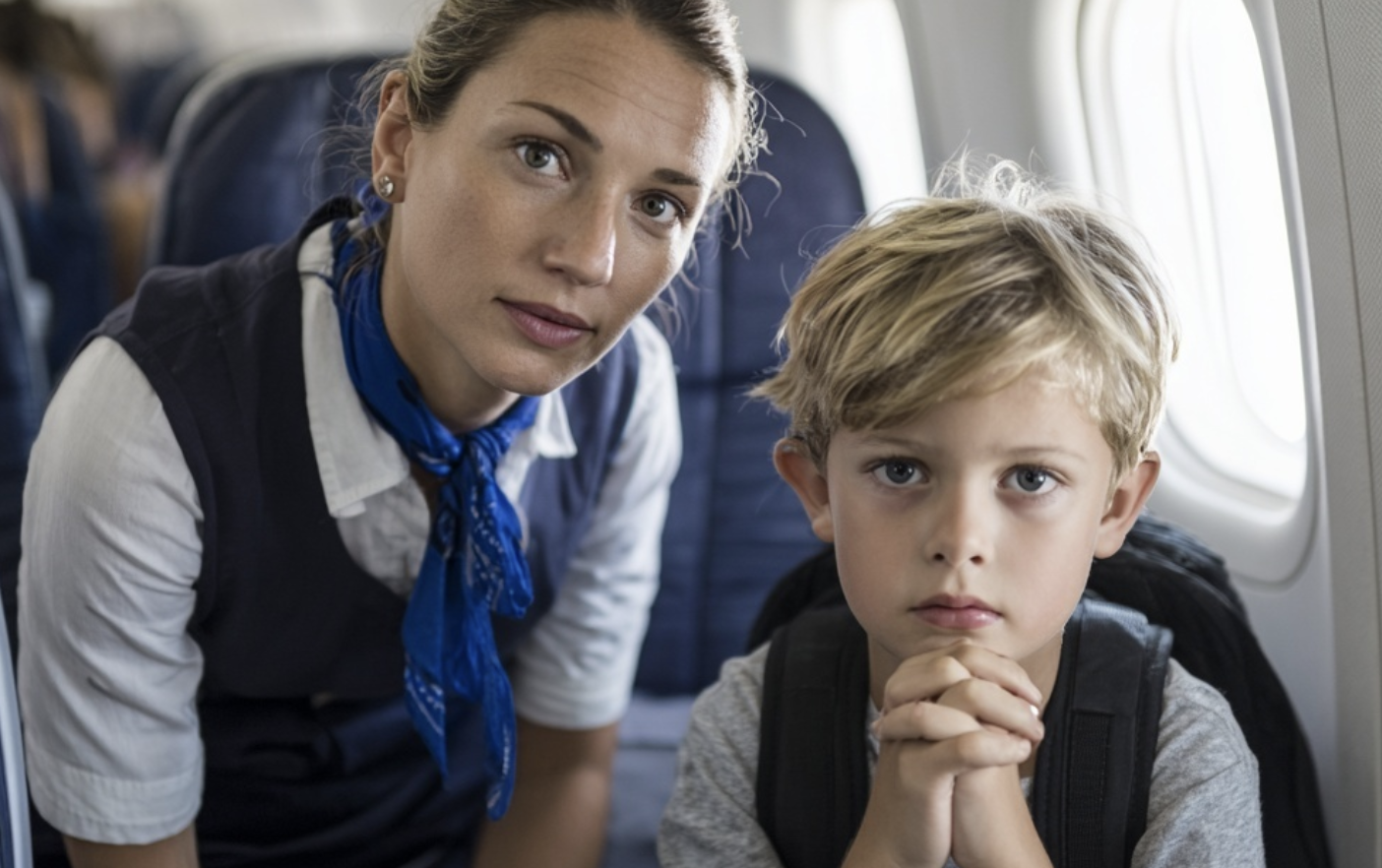The engines thrummed like a steady heartbeat as Flight 237 lifted westward out of New York. Most travelers slipped into their airborne rituals—earbuds in, magazines open, neck pillows snapped shut. A few were asleep before the seatbelt sign blinked off.
For Sophia Turner, ten years in the sky hadn’t dulled a thing. There was no such word as routine in her vocabulary. Service, to her, wasn’t coffee and crackers—it was presence. It was noticing the stiff shoulders of a nervous flyer, the dry lips that meant someone needed water, the way a parent’s smile faltered when both toddlers melted down at once.
Moving through the aisle with practiced ease, Sophia slowed at row 18. A boy, maybe ten, sat by the window with an empty seat beside him. The leather swallowed his small frame. He clutched a backpack to his chest like a shield.
Curious kids let their eyes wander. His didn’t. They darted—quick, alert, assessing. His fingers twitched into a shape, then redid it, precise and deliberate.
Play, she thought. Then her pulse quickened. Not play.
She knew that gesture.
The silent signal for help.
Sophia knelt, careful to meet his gaze without crowding him. “Hey, sweetheart,” she said, that gentle voice she saved for frightened passengers. “I’m Sophia. Are you okay?”
His mouth trembled. He checked the aisle, then whispered, “I… I can’t find my mom.”
Relief swirled with concern. Not a predator—just separation. But fear felt the same inside a small chest.
“You’re not seated with her?” Sophia asked.
He shook his head and clutched the backpack tighter. “They sat us apart. I don’t know where she is.” Tears pooled, glassy and sudden.
“You did exactly the right thing,” Sophia said, smiling. “We’ll find her together.”
In the galley, she scanned the manifest. “What’s your name, honey?”
“Ethan. Ethan Harris.”
“Harris,” she murmured, tracing columns until she found it: Emily Harris, seat 32C.
Sophia walked to the back. In 32C sat a woman in her early thirties, fingers laced so tight her knuckles blanched.
“Mrs. Harris?”
The woman startled. “Yes?”
“Your son is in row 18. He’s been very brave, but he’s scared.”
Color drained from her face. “They told us the flight was full—I thought he was only a few rows away. I didn’t realize…” She swallowed hard. “He must be terrified.”
Minutes later, Sophia returned, Ethan’s small hand warm in hers. He spotted his mother and broke free.
“Mom!”
Emily stood so fast her seatback thumped. She folded him into her arms and held on as if the air itself might pull him away. Ethan tucked his face into her shoulder and sobbed with relief.
“I couldn’t find you,” he hiccuped. “I thought I lost you.”
“Oh, baby,” she murmured into his hair. “You will never lose me. I’m right here.”
Around them, the cabin softened. A woman across the aisle wiped at her eyes. The gentleman two rows back smiled into his book. The grandmother in 31A leaned forward and whispered, “What a clever boy.”
Word rippled the way it does on airplanes, moving seat to seat like a quiet tide.
“That was the hand signal,” a twenty-something murmured to his friend. “I saw it on the news.”
A mom tapped her daughter’s arm. “See? That’s why we learn these things. They matter.”
Sophia updated the cockpit. A few minutes later, the captain came on, voice warm, careful not to turn the moment into spectacle.
“Ladies and gentlemen, a quick note from the flight deck. We want to commend one of our youngest passengers for the courage to ask for help when he felt uncertain, and our crew for responding quickly. A little awareness and a little bravery can go a long way.”
Applause scattered through the cabin like rain on a roof. Ethan hid, blushing, in his mother’s shoulder.
Later, when things settled back into the soft hush of cruise altitude, Sophia stopped by to check on them. Emily’s eyes were damp but grateful.
“I can’t thank you enough,” she said. “I assumed he’d manage for a short time. I didn’t realize how scared he was. You saw him when I couldn’t.”
Sophia shook her head. “He’s the hero here. He remembered a way to ask for help and used it. That’s hard, even for adults.”
Ethan peeked up shyly. “We learned it at school. They said it was for emergencies. I wasn’t sure this counted, but… I was scared.”
“It absolutely counted,” Sophia said, bending to his level. “You did everything right.”
By touchdown in Los Angeles, Ethan’s hand was threaded through his mother’s, no daylight between them. Passengers passing in the aisle offered him small, conspiratorial smiles.
“Good job, buddy,” someone whispered as they waited to deplane.
That evening, Emily shared the story online—how an attentive flight attendant saw her son, really saw him, and how a simple hand signal turned fear into safety. Parents circulated the post and made quiet promises to teach their kids the same gesture.
Reporters eventually called Sophia. Her answer never changed: “I didn’t do anything extraordinary. I just paid attention. Ethan had the courage to ask for help in the way he knew.”
For Ethan, a flight that began in panic ended in pride. He learned something he would keep: scared and strong can happen at the same time.
For Sophia, it was another reminder that her work lives in the space between the obvious tasks—in the noticing, the listening, the human part.
And for everyone seated on Flight 237 that day, it became one of those stories you carry away from an airplane along with your carry-on: a boy, a silent gesture, and a cabin full of strangers briefly connected by the same small truth—that awareness and kindness travel well at 30,000 feet.
Heroes, it turns out, don’t always wear capes. Sometimes they’re ten, and brave enough to quietly raise a hand.
